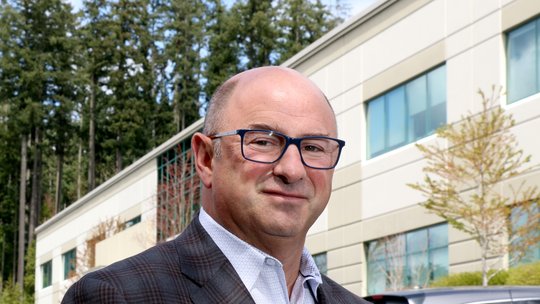
Clay Siegall, co-founder and former CEO of Bothell-based biotech Seagen, is guiding his new biotech through a merger.
Morphimmune, which named Siegall as its CEO in March, on Thursday announced it is merging with Exton, Pennsylvania-based Immunome (Nasdaq: IMNM).
Siegall will be president and CEO of the combined company, which will keep the Immunome name, and the headquarters will be in Seattle.
A company spokesperson told the Business Journal Morphimmune, which spun out of Purdue University and was initially headquartered in West Lafayette, Indiana, has considered Seattle its headquarters since Siegall took over in March. The spokesperson added that the combined company will have about 50 employees and keep research labs in Exton and West Lafayette.
The companies aren't disclosing financial terms of the deal, which is expected to close by the end of the fourth quarter.
"Clay Siegall's track record of drug development and shareholder value creation is exceptional, and we are honored to have him serve as chairman and CEO after the merger closes," Michael Rapp, Immunome board chairman, said in a release.
The spokesperson added that Seattle has the resources to build a preeminent oncology company, and Immunome "will evaluate opportunities for growth." According to a news release, Immunome shareholders will own about 55% of the combined company upon closing, while Morphimmune shareholders will own about 45%.
Along with the merger news, Immunome on Thursday announced a $125 million private placement investment from institutional investors. The investment is also expected to close in the fourth quarter, and it will go toward advancing the company's pipeline and general working capital. Immunome expects to submit three investigational new drug applications within 18 months of the investment closing. The release noted Immunome "will be well-positioned to explore opportunities for strategic in-licensing and further acquisitions."
Morphimmune, founded in 2020, is a preclinical, cancer-focused biotech that targets payloads to diseased cells, reducing toxicity and improving efficacy. Immunome, meanwhile, was founded in 2008, according to its LinkedIn page. The company is focused on cancer and infectious diseases. Its Covid-19 treatment is in Phase 1 clinical trials, while the rest of its pipeline is in research and pre-clinical stages.
Siegall resigned from Seagen in May 2022 following an arrest on suspicion of domestic violence. The city prosecutor later declined to file charges, citing "evidentiary issues."
Seagen, co-founded by Siegall in 1997, has four approved cancer medicines on the market, which are aimed at Hodgkin lymphoma and bladder, breast and cervical cancer. The company generated $2 billion in revenue last year. In March, pharmaceutical giant Pfizer announced plans to acquire Seagen for $43 billion. The companies expect the deal to close later this year or early next year. Former Novartis executive David Epstein took over as Seagen's CEO in November.








